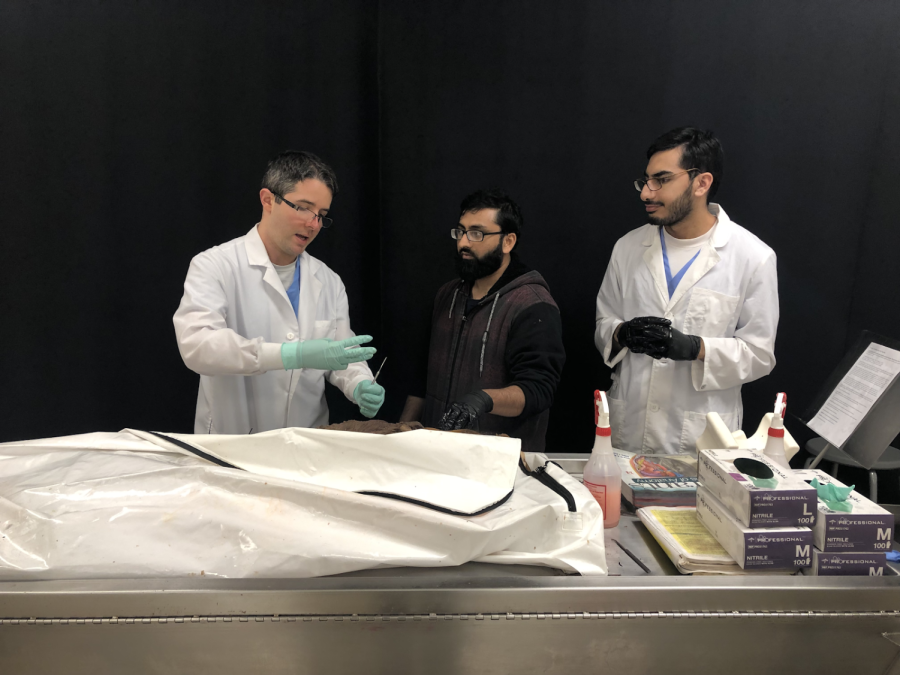Graduate students discuss challenges of balancing teaching, coursework
Morgan Chaney (left) demonstrates on a cadaver to his class and students Naeem Virk (middle) and Uzair Mumtaz (right) assist in the demonstration.
March 19, 2019
After waking up between 7 and 8 a.m. and driving to Kent State, Morgan Chaney begins each day sitting in his office, where he works all morning long. At 1 p.m. he gets in his car and drives to go teach at the College of Podiatric Medicine.
After a long day of teaching or working, Chaney will head home to relax, eat dinner and spend time with his wife. The only difference between the work Chaney does and some of his colleagues is that Chaney is still a student.
Living in Kent with his wife Kaylee Heiremans, Chaney is a PhD candidate in the School of Biomedical Science in the human evolutionary biology program. Chaney started his degree back in the fall of 2013 and is set to graduate in spring of 2021.
Before starting in the doctoral program, he received his Masters of Arts in anthropology in 2015 and taught for two years at Palestine-Wheatley Middle School.
Although Chaney admits his story may be different from other graduate students due to his wife, there are still many experiences he shares with others. One he experiences is the sense, or lack, of completion.
Five ways to work through stress as a graduate student
You are the number one thing to worry about: In order to do well in classes and other life aspects, one has to have good mental health as studies show that those who report having mental health issues also receive lower grades.
Find a work and personal life balance: Although it is tempting to work from home or handle personal stuff in the office, it is important establish your own personal balance of work and home so that you can ensure everything gets done.
Drinking should not be a crutch: When entering graduate school many people are above the age of 21 and therefore can legally drink. This can invite the possibility of people using it as an outlet for dealing with stress which can lead to further problems such as job loss, relationship issues and even legal issues.
It’s ok to “log-off” and take a break: It is hard to walk away from work but it has been proven that breaks are beneficial and that overworking can even to low quality output. Knowing your limits of what is too much work is important so burnout does not occur.
Graduates can ask for help too: Even with undergraduate experience, there are new challenges that come about in graduate school so it is important to remember to still ask for help. Professors and advisors are always ready to help or point you in the direction of someone who can.
“Grad school is very much task-based … you don’t just walk in and put your time card in and you get credit for being there,” Chaney said. “You have to produce something. And many of those products sometimes take a good amount of thought and consideration.”
This is something Chaney struggled with especially at the beginning of his journey as a graduate student. He started out as a teaching assistant and faced many hardships as he tried to understand what he was doing.
“So my first year or two was really, really rough because I was also trying to do my genetics research and (teaching) and it just got really overwhelming at times,” Chaney said.
Since starting his dissertation, he hasn’t faced as many issues but now has to juggle making progress in it. Since dissertations are different per person, it’s hard to see how much work has done by comparing to others.
“While you’re trying to produce things sometimes the things you are trying to produce are very much in your head,” Chaney said. “And you’re working through something, and it’s very meditative and it’s not a lot of actual tangible product.”
With it being hard to see the progress that they make, many graduate students struggle to feel like they are accomplishing anything, which can cause many personal things to fall behind as sociology doctoral student Tim Rose has found.
“You’re not going to go do laundry because you’re stressing about working on things,” Rose said. “Or you’re working on things (so) it’s easy to fall behind on taking care of everything back home.”
Being in his fifth year of the doctoral program, Rose has discovered that life doesn’t only revolve around school work.
“You have to learn to keep the non-academic parts of yourself alive because if you don’t make a conscious decision to do that you won’t be able to because the natural suck of time,” Rose said.
However, as Rose finishes out his 10-year college career, the one difference he realized between his time as an undergraduate and a graduate student was what he learned by the end.
“I always had to tell my younger graduate student friends this because you forget when you come here,” Rose said. “You were primarily a student when you’re an undergraduate, but you have to remember as a graduate student you’re not going to grad school to learn to be a student, you’re going to grad school to learn to be a professional.”
Rachel Karas covers graduate education and research. Contact her at [email protected].












